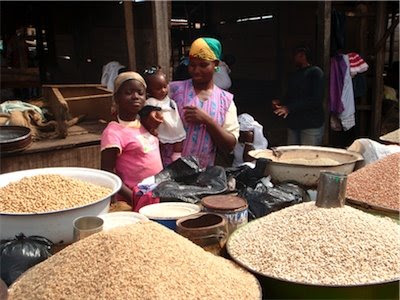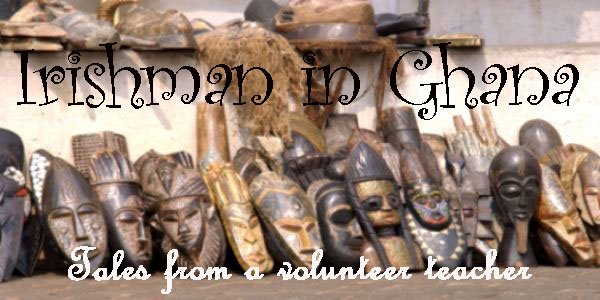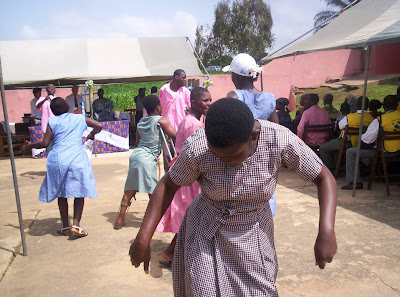 Outside the tailoring room. Boys dormitory and toilets in the background. Immanuel taking a beak.
Outside the tailoring room. Boys dormitory and toilets in the background. Immanuel taking a beak. Edwenase Rehabilitation Centre - Staff and Students
Edwenase Rehabilitation Centre - Staff and StudentsI've been just over 2 weeks in Ghana now. Tonight I found a great internet cafe so hopefully I can update this blog a bit more. The below entries have been waiting patiently to be uploaded for a week. At last they can see the light of cyber-life. I hope they can give you some insight into daily life here from theperspective of an 'Obroni' (Twi word used to describe anybody with white skin).
Kejetia MarketThe livelihoods of thousands of Ashanti region families rely upon daily business at Kejetia market in downtown Kumasi. From the fishermen who supply dozens of fresh choices to the traders, to the weavers who provide yards and yards of traditional, beautifully coloured kente cloth for people to use as curtains, dresses, trousers, shawls and shower towels, amongst many other purposes.
From a high vantage point, the sprawling mass of individual units and mobile sellers seems to be a chaotic mess. But everything has it's own 'way' here, and once one steps of their global northern horse for a moment, the particular districts specialising in certain commodities become more apparent. Entering from the tro tro (minibus) station side, one approaches the stationary area, advancing eastwards towards sweets, lanterns, cups, buckets, brooms, and general household materials. After a few hundred metres one may stumble upon a disused railway track (Ghana's railways are somewhat obsolete and unused nowadays) is home to general clothes, progressing from menswear trouser and shoe wear to women and children's casual western style clothing. It reminded me of images I have seen from a great distance of the Kibera slum district in Nairobi, Kenya – though trading actually occurs on a live railway there and traders have to be efficient in gathering their stock out of the way when trains appear.
Branching off to one of the labryinthine side streets after 200 metres of railway, with a quick sniff you will wander into the nut quarter, and soon afterwards into the massive fish section. Before coming to Ghana I rarely ate fish, but given the fact that I have no or little other source of protein apart from daily fish portions served at dinner, my past habits have gone to the wayside.
Even for carnivores I would imagine that the sight of cows' heads in the back seat of a car are enough to speed up your departure from the meat section. The more pleasant smell of peanut butter and colour of traditional cloth stalls attracted our eyes and we ended up having a useful Twi lesson from the owner. Dorota bought 2 yards of beautiful cloth for a trousers to be sewn in the tailoring workshop at Edwenase Centre. I got 2 yards of cloth to work dually as a cover in bed and a spare, quick to dry shower towel.
After about 3 hours we had pencils, pens, rulers, sketch pads, cups, traditional cloth, soap, a clothes brush and other assorted items in our bags as we headed back to the Centre for lunch.
Edwenase Rehabilitation CentreWell, my first full week at Edwenase should have been a week to remember but it was so full of activities that I can hardly believe it is already over.
Monday saw Markus from Germany, Mattia from Italy and I cover for the rural craft teacher. We had already done 3 days of his class the previous week, though given the lack of materials, and the students' multiple special needs the class is usually somewhat idle. So after playing Uno playing cards for numeracy and colour recognition, basketball and bowling for fun and accuracy, dominoes, paper plane construction and flying competitions, we decided to keep the inclusive and participatory nature of the class going.
With 'Mikado' game sticks we made the outline of a Ghanaian flag: red (representing the blood of their ancestors), green (for the beautiful fauna throughout large parts of the country) and gold with a black star representing one of their key resources (exploited by Anglo Ashanti Gold) and pan-Africanism, respectively.
Other stuff I have been involved with is our Christmas Card Action, teaching the director basic computer skills, teaching English to Rita, the Needlework teacher and Centre supervisor, co-planning literacy classes for the 70 students (due to commence soon), sports games and activities, general maintenance, manual and cleaning work around the Centre, helped organise the Centre's first group photo, amongst many other things.
I'll write more details in my next blog.
One thing is for certain, there is always something to do at Edwenase Rehabilitation Center in Kumasi.
I'll upload some more photos of our work as soon as possible.
Hope the photos included here satisfy any hunger for images and less text. I'm grateful to Dorota and Lena for allowing me to use them from their blogs.
Dorota's blogLena's blog


 Methodist Women's Fellowship from Patase last week donating Brazilian sugar, Uruguayan rice, Malaysian cooking oil, and Italian tomato sauce
Methodist Women's Fellowship from Patase last week donating Brazilian sugar, Uruguayan rice, Malaysian cooking oil, and Italian tomato sauce Women traders who requested a photo from Dorota in the National Democratic Congress stronghold section of Kejetia market
Women traders who requested a photo from Dorota in the National Democratic Congress stronghold section of Kejetia market




 Kitchen staff at Edwenase
Kitchen staff at Edwenase




 Getting ready for Dec. 7th elections
Getting ready for Dec. 7th elections





















